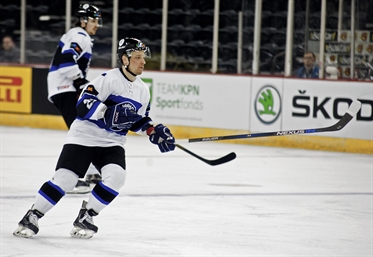Estonia's Mr. Reliable
Estonia's Mr. Reliable
Makrov continues to lead from the front

 Estonia's Andrei Makrov in action at the 2017 IIHF World Championship Division IB in Belfast. Photo: Ian Offers, GBSC
Estonia's Andrei Makrov in action at the 2017 IIHF World Championship Division IB in Belfast. Photo: Ian Offers, GBSC
Andrei Makrov, Estonia's all-time record scorer, is a veteran of 17 World Championship campaigns. But the 37-year-old, who spent last season playing in Kazakhstan, Belarus and Poland, is in no mood to look back at the past while there's a job to do preserving his country's Division IB status.
Victory over Croatia on Friday - inspired by two more goals from Makrov - has put smiles back on Estonian faces after three defeats in its opening games. But it's too early to celebrate an escape from relegation, since defeat in Saturday's game against the Netherlands could yet push the Baltic nation into last place. It's a situation that prompts memories of the final day in Eindhoven two years ago. That time, Makrov scored a hat-trick in a 3-1 win for Estonia, sending the Dutch down. But for now, that's consigned to the history books.
"It was nice to get the goals and win the game, but now it's just a memory," he said. "Scoring goals, scoring hat-tricks, depends on the whole team, on your line-mates. We have a job to do here; we will keep trying and I think everything is still possible for us."
Makrov's role on the roster has changed over the years since he exploded onto the World Championship stage with seven points from seven games in 2000, only his third appearance at that level. Today, along with team captain Lauri Lahesalu, he's one of the veteran players who brings experience and guidance to a line-up that features a number of youngsters who have yet to play the game professionally. Described as "an Estonian warrior" by head coach Jussi Tupamaki, Makrov is enjoying that responsibility.
"I guess the younger guys look at how I play, how the other experienced players do it," he said. "They watch us, they try to pick up something from that. At least, I hope they do!
"All the players who have been on the national team for a few years need to set a good example, to show how we can win games, how we need to play to be competitive."
Makrov's long career has seen him play in Finland, Russia, Kazakhstan, Belarus, Slovenia, Poland and Great Britain but - so far - not in his native Estonia. The lack of opportunity is not due to any lack of local interest; when Dinamo Riga played a couple of KHL games in Tallinn last December there were sell-out crowds and international competitions have been well-supported. But the financial costs of a pro team in the Baltic nation remain prohibitive.
"Estonia is not such a rich country, there isn't a wealthy sponsor who could hand over 20 million Euros to create a pro hockey team," Makrov explained. "People back home love their hockey - all sports are popular in Estonia - and we have the arenas and the infrastructure. It's just a question of cash. If the funding was there, I'm sure we could have a professional club."
That's why Makrov's own career - in addition to 117 points for his country - has taken in championship seasons in Belarus and Slovenia, plus time in Russia's top league with Molot-Prikamie Perm. It's also why he is very conscious of the leap in class facing young players who emerge from Estonia's amateur leagues to step on the ice against full-timers from around the world.
"Every game here, every guy playing against us is a professional," Makrov said. "We've got new youn g players on our team who have come from amateur hockey. That's one of the reasons why we find it tough, it's a big step up for those guys.
"And, unfortunately, Estonia has this kind of tradition where we lose our first game and then we have to play catch up. Often it’s only at the end of the tournament when we really start to show what we can do. The level of the opposition doesn't always help as well - in our opening games here we played the three strongest teams in the competition.
"It's not really for me to judge how it's all working out, but in the end I'm sure we will be fine."
Back to Overview













































